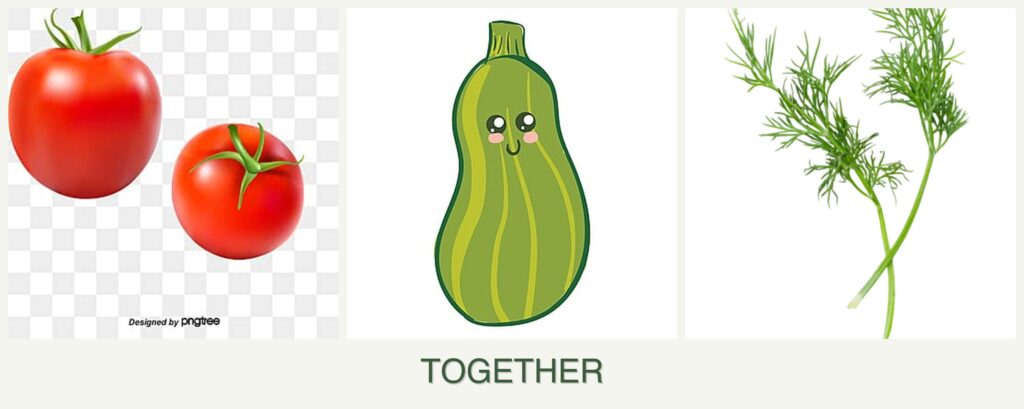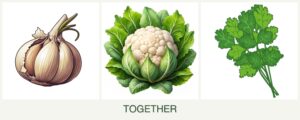
Can you plant tomatoes, zucchini and dill together?
Can You Plant Tomatoes, Zucchini, and Dill Together?
Companion planting is a popular strategy among gardeners seeking to maximize space, enhance plant health, and deter pests naturally. When it comes to tomatoes, zucchini, and dill, understanding their compatibility can lead to a thriving vegetable and herb garden. In this article, you’ll learn about the compatibility of these plants, their growing requirements, and practical tips for successful planting.
Compatibility Analysis
Yes, you can plant tomatoes, zucchini, and dill together, but with some considerations. These plants have complementary characteristics that can benefit each other when grown in proximity. Tomatoes and zucchini both thrive in full sun and have similar watering needs, while dill can act as a natural pest deterrent. However, it’s crucial to manage spacing and nutrient competition to ensure each plant receives adequate resources.
Key Factors
- Growth Requirements: Tomatoes and zucchini require full sun, while dill can tolerate partial shade, making them suitable companions.
- Pest Control: Dill attracts beneficial insects such as ladybugs and predatory wasps, which can help manage pests that attack tomatoes and zucchini.
- Nutrient Needs: All three plants benefit from nutrient-rich soil, though zucchini is a heavy feeder and may require additional fertilization.
- Spacing: Proper spacing is essential to prevent overcrowding and ensure each plant receives sufficient sunlight and airflow.
Growing Requirements Comparison Table
| Plant | Sunlight Needs | Water Requirements | Soil pH | Hardiness Zones | Spacing | Growth Habit |
|---|---|---|---|---|---|---|
| Tomatoes | Full sun | Moderate | 6.0-6.8 | 3-10 | 18-24 in | Upright, vining |
| Zucchini | Full sun | Moderate | 6.0-7.5 | 3-9 | 24-36 in | Bushy, spreading |
| Dill | Full sun/partial shade | Moderate | 5.5-7.0 | 3-11 | 12-15 in | Upright, feathery |
Benefits of Planting Together
- Pest Repellent Properties: Dill attracts beneficial insects that prey on pests harmful to tomatoes and zucchini.
- Improved Flavor: Some gardeners believe dill enhances the flavor of tomatoes.
- Space Efficiency: By interplanting dill, you can maximize garden space without overshadowing larger plants.
- Soil Health Benefits: Diverse plantings can improve soil structure and reduce disease spread.
- Pollinator Attraction: Dill flowers attract pollinators, which can enhance fruit set in tomatoes and zucchini.
Potential Challenges
- Competition for Resources: Zucchini’s rapid growth can overshadow dill if not properly spaced.
- Different Watering Needs: While all require moderate watering, overwatering can harm dill.
- Disease Susceptibility: Close planting can increase humidity, promoting fungal diseases.
- Harvesting Considerations: Zucchini’s sprawling nature can make harvesting dill challenging.
- Solutions: Use trellises for tomatoes, mulch to retain soil moisture, and stagger plantings to manage growth.
Planting Tips & Best Practices
- Optimal Spacing: Ensure at least 18 inches between tomatoes and zucchini, and 12 inches for dill.
- Timing: Plant after the last frost when soil temperatures reach at least 60°F.
- Container vs. Garden Bed: Use containers for dill to manage its spread, or dedicate a section of the garden bed.
- Soil Preparation: Enrich soil with compost and ensure good drainage.
- Companion Plants: Basil and marigolds can also be planted with these crops to enhance pest control and growth.
FAQ Section
-
Can you plant tomatoes and zucchini in the same pot?
- It’s not recommended due to their size and root spread; they thrive better in separate containers or garden beds.
-
How far apart should tomatoes and zucchini be planted?
- Maintain at least 24 inches between them to allow for adequate growth and airflow.
-
Do tomatoes and dill need the same amount of water?
- Yes, both require moderate watering, but avoid overwatering dill.
-
What should not be planted with tomatoes, zucchini, and dill?
- Avoid planting potatoes near tomatoes due to shared pests and diseases. Cucumbers can compete with zucchini.
-
Will dill affect the taste of tomatoes?
- Some gardeners believe dill enhances tomato flavor, though this is subjective.
-
When is the best time to plant tomatoes, zucchini, and dill together?
- Plant after the last frost in spring, ensuring warm soil and consistent temperatures.
By understanding these plants’ compatibility and requirements, you can create a harmonious and productive garden. Happy planting!



Leave a Reply